4/2/2004 MEASURE Poll:
The Israeli
Withdrawal from Gaza and Proposed
Annexation of West Bank Settlements PDF/Printable Video Overview from C-SPAN
The Middle East Academic Survey Research and
Exposition project polled 100 Middle East academics about a proposed Israeli
withdrawal from Gaza.
The survey was fielded between March 22 and April 2, 2004.
Drawn from a pool of 2,300 academics with advanced degrees in Middle East area studies, IRmep compiled and
presents 100 survey responses. This poll
should not be interpreted as a statistically significant reflection on the views of all US Middle East academics.
Question #1
Does the US currently
have the global credibility and legal authority to legitimize a unilateral settlement
giving Israel lands
outside of 1967 borders?
(Source: IRmep MEASURE 2004)

Question #2
How would the
formal US recognition
of annexation of territory outside the 1967 borders likely affect terrorist attacks in the
Middle East?
(Source: IRmep MEASURE 2004)

Question #3
How would the
formal US recognition
of annexation of territory outside the 1967 borders likely affect terrorist attacks in the
United
States?
(Source: IRmep MEASURE 2004)
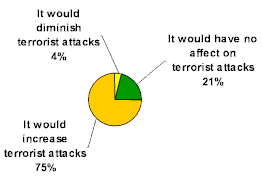
Question #4
Which factors
could be most important in driving a US decision on whether to recognize land outside of
1967 borders as part of Israel?
(Source: IRmep MEASURE 2004)
a.
Concern for the safety and security of Israeli citizens.
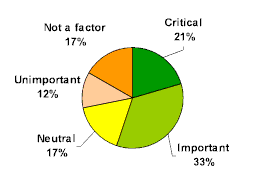
b.
Concern about winning the US
led "war on terror".
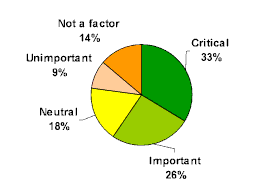
c. Lobby-driven domestic political concerns.
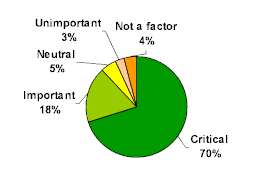
d.
2004 presidential elections in the US.
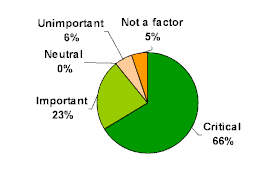
Question #1
Comments
Does the US currently
have the global credibility and legal authority to legitimize a unilateral settlement
giving Israel lands
outside of 1967 borders?
These borders
aren't even legal according to UN resolutions. If
it were any case other than with Israel the question
wouldn't even arise.
U.S. foreign policy
with regard to the Arab/Israeli question has only further angered the radical Muslims of
the Middle East. The US government has
shown over and over how very little it really understands the needs of the non-Israeli
people of the region.
The US has the muscle
to do whatever it wants; the issue concerns the willingness to act for the benefit of both
sides. Thus the answer is NO to the phrase "outside the 1967 borders.” These
borders were determined by international law, through the UN.
Must be done in
negotiations with the Palestinians and as part of a total peace negotiation.
Where is the
legal authority? Forget global credibility. Only if we want Armageddon early this year.
Bi-lateral
agreements between the US and Israel cannot
supercede international law.
The US has not been
and remains an impartial player that lacks the credibility in much of the region
The issue here
is legal authority - the US is not the
first world power and will not be the last. Suppose
the next "cedes" US territory to
another nation?
But it does
have the power to do so in other words, it will do it, the rest of the word will yell and
it will happen anyway.
If the
Palestinians, the Arab states, the Muslim activists do not accept any settlement, it will
not be worth the paper on which it is written.
Cease building
the wall. Encourage a new Palestinian
leader by providing money for schools and healthcare.
Bring the Arab
states into an international meeting with Israel to be held in Europe.
Not all
problems will be solved by moving back to the 1967 lines
In a few words:
The conflict needs “an honest broker."
US credibility
will dramatically fall if this is supported.
Why should Israel be given any
territory in the West Bank? This countermands the Oslo agreements and
the whole idea of a staged withdrawal. The
questions in this survey are really improperly stated -- It is NOT a matter of the US's rights or
abilities to annex territories that it does not "own" - But it is the US international
stature and ability to legitimize a settlement that is the issue. Since you have not explained how MUCH territory, or
where it is in the West Bank, or why it
must be exchanged, my responses will be skewed.
I definitely approve of US involvement
A.S.A.P. to bring about a negotiated peace - but without the above information, I can't
answer properly.
Implement them
within a negotiated solution.
Proceed from
the Saudi proposal.
Israel and every
other nation are bound by international law. Israel must comply
with UNR 242 and 338. Israel must also
cease its racist practices against the Palestinians, including but not limited to
exclusive privileges for Jewish citizens, the denial of return to Palestinian refugees and
the building of the apartheid wall on Palestinian land.
No one does.
Very bad move. Israel has to
withdraw from all the territories occupied in 1967 war. There cannot be real justice and
peace without it.
Such a move
will only deepen current resentment on the "Arab Street."
The US should put
pressure on Israel to respect the
1967 borders in order to reestablish its global credibility. It should stop siding with Israel blindly.
In 1967 the
entire world community--with the exception of Israel--expected Israel to withdraw to
the 1967 borders. It should be U.S. policy that Israel be required to
do so.
The U.S. never has the
legal authority to legitimize Israel taking lands
outside of its 1967 borders. It is not the
right of the U.S., I believe, to
give away either Arab or Israeli land.
The
international community has already agreed on many occasions that the 1967 lines are what
is needed to end this conflict. Also, the Arab World (including the Palestinians) would
accept no less, which are Israel's direct
neighbors, not the US.
But it will
solve enough to where Palestinians will finally have an independent homeland
The U.S. and Israel have no legal
authority whatsoever to seize any portion of the West Bank, Gaza Strip,
or the Golan
Heights. Both are
suffering from almost total lack of credibility within the world community for their rogue
actions, and arrogant "might-makes-right" attitudes.
The US administration
has taken quite a blow to their credibility over the past year.
US does have
credibility at the most Arabian governments because USA have solved
their problems with Israel as happened
with Egypt after 1973
war.
Enforce, yes.
Legitimize, no, as US legitimacy in Arab world = 0.
The Israelis
and the Palestinians to secure politically distinct states along the territorial lines
that were explicitly recognized by the international community prior to 1967 is the basis
for any eventual just settlement. Negotiations
between the two states
Violation of
the 4th Geneva Convention.
It has neither
the global credibility nor the international legal authority to give away territory. It is illegal under the Geneva Conventions for an
occupying force (Israel) to annex
occupied territory unilaterally; it is therefore illegal under the same Convention for the
US to bless such
a unilateral annexation.
The US lacks the
legal grounds for making these determinations, which belong properly in the UN from which
the initial 1947 plan emerged, as unrealized as it has been.
Furthermore, the US has
increasingly lost whatever legitimacy it once had in dealing as an "honest
broker" in the Israel Palestine Conflict. In a word, the US has been
perceived and has, in many instances, become increasingly a biased party to the conflict
in practice as well as in policy statements and omissions.
The right of
two peoples
U.S. policy is so
shameful that even to call it that purports to give dignity to the something from a sewer.
No one has the
right to give Israel lands outside
of 1967 borders.
On the one hand
the US is the only
broker available with authority recognized by both sides.
On the other hand, I do not believe that the international community would
accept any annexation that does not also have UN approval.
The US could
recognize unilaterally, but does not have the power to legitimize unilaterally.
Any US credibility
that existed at the end of the Clinton Administration has eroded almost completely with
the Bush Administration's ideological bent in Middle East politics. However, it is clear that nothing will move forward
without the US.
US is committed
to push Israel to implement
all the UN Resolutions concerning the Arab-Israeli conflict.
America has a long
history of overwhelming support for Israel during
"peace negotiations". Our current regime is viewed with extreme cynicism in the Middle East and has
shown almost no concern for the rights of Palestinians. Israel needs to
withdraw to its '67 borders. The occupation must end. But America has no will to
bring things to a just conclusion, instead we support Israel's constant
efforts to expropriate more land, build illegal walls/borders, and trample the human
rights - not to mention lives - of Palestinians.
Taking land as
a result of occupation is a clear violation of international law and will not settle the
conflict or increase Israeli security, but will increase existing injustice towards
Palestinians.
Absolutely not. We are seen as maintaining a double-standard when
it comes to Israel, instead of
holding it accountable to ALL UN resolutions, as other nations are expected to do. The
only way to regain our credibility is to act with honor and abide by international law and
make all our allies do the same. Then you will see the shift in world opinion, including
among many right here at home.
The US and the
international community have always considered these settlements to be contrary to
international law, including the Fourth Geneva Convention of 1949. To flip flop and unilaterally recognize any such
settlement as legal Israeli territory would have no international support and, indeed,
would diminish US credibility
even further.
The current US administration
is not perceived, internationally or regionally, as an "honest broker" in the
Israeli-Palestinian conflict.
The question is
worded problematically. Can the US legitimize a
unilateral settlement recognizing Israel's
appropriation of lands outside its 1967 borders, meaning lands in the West Bank, Gaza, or Golan? No one can legitimize such an appropriation. The only way that such an appropriation could be
made legitimately would be through a negotiated settlement between Israel and Palestine, in which a
Palestinian government agrees to recognize Israel's seizure of
certain of those lands, probably in exchange for others. Unilateralism really is not a
good approach for creating an impression of legitimacy.
Israel will do as it
pleases and the US will slap
fingers at most.
The US has little to
know credibility in this or any other area re: to the Israeli/Palestinian Peace Process.
The issue is
between Israel and the
Palestinians, not the US. The US involvement is
a major part of the problem. Current US policy is very
pro-Israel and is the $2 billion a year in foreign aid to Israel. The US has no legal
authority in Israel. How would US citizens feel
if another country voiced support and "legal authority" in the disposition of
land in the US?
Question #5
Comments:
Other
comments and observations about realistic territorial solutions that provide security to
Israelis and Palestinians:
A true solution would be to recognize Palestinians and Israelis as equal citizens with
equal rights and benefits and representation in the same state. Impossible in current Israel because of its
linking religious identity to citizenship. The US would also not
support a representative government in a newly structured state because it feels secure in
its relationship with Israel and uses its
geographic location and military to secure insurance for its claims to oil. Both the
current Israeli government and the US government
benefit from oppression of Palestinian people in that the oppression creates violence
which legitimizes the use of state force.
The solution
has to be created and implemented by Israelis and Palestinians together. If the US can help do
that, fine. There can be no solution without the inclusion of Palestinians in decision
making and implementation, nor with only US Israeli action.
The full
pressure of the US government
should be brought to bear on Israel to stop the
horrible murder of Palestinians. The current
leader of Israel killed the
efforts for peace, of the last Prime minister. He
should be forced out of office. It is
unconscionable that the US Government has NEVER taken seriously the issues of the
Palestinians.
Israel and the US must sit down
with the democratically elected officials of Palestine. Support for
the legitimate PA authority must begin at once. The
only solution will be to remove most of the Israeli settlements and create a viable
Palestinian state, not disconnected enclaves.
Security for
Israelis will come with the end of their occupation of Palestinian lands. The only reason for Palestinian violent reaction is
the violence which is visited upon them daily from Israeli armed forces and border guards
and the inhuman conditions under which they are forced to live by the occupying power. The US needs to stop
supporting Israeli occupation and human rights violations by withholding financial and
military aid from the Israeli government. The US needs to
actively push for implementation of relevant UN resolutions rather than making two unequal
sides "negotiate". This will go a long way towards making us more safe here in America. It has not been done up to now because of
Lobby-driven domestic political concerns. However,
there are a lot of people who feel the same way I do, and the US
government's needs to put this to the test. Maybe
by doing the right thing, they will win domestically also.
A peaceful
two-state solution would probably be a reality today or near to it if Sharon had not pulled
out of the Taba negotiations after his election in 2000.
According to Israeli and Palestinian negotiators they were within two weeks
of an agreement but Sharon did not want a
peaceful settlement.
I feel as
though reference to US national interests need to be made somewhere in this survey.
The 1967
borders will be the basis for peace between Israel and its
neighbors plus the Palestinians, with guarantee of the borders by the US, UN, and
European Union. This is the proper way to go.
Israel should be
content with having colonized two-thirds of Palestine and get on
with life inside of its own borders. Revisionist Zionists and their ilk are the biggest
threat to security in Palestine.
As long as Israel insists on
taking land, demanding security, economic & political support from the US with minimal
thought to Palestinian rights to their homeland US support will be harmful to peace &
our credibility in the eyes of the world. Without world support full peace cannot be
established.
It's
interesting to note the utter lack of concern, on this survey, with notions of justice and
international law; there are only bland pronouncements concerned with "security"
which has always stood as a cover for maintaining the status quo of Israeli hegemony.
Immediate
implementation of resolution 242, the only internationally recognized basis (incl. by the
warring parties) for co-existence, as confirmed by recent Arab overtures such as the Fahd
plan.
Give back all
the territory conquered in 1967 including Jerusalem to have a
lasting peace. Your questions are also framed to solicit a particular response, which is
dangerous.
More Arab
public attention needs to be given to the fact that Iran is backing this relatively new
type of Palestinian terrorism, and the high cost people all over the Middle East have
paid; in the tourist industry, for example.
Public
attention in the Arab world needs to be drawn to the fact that Iran is backing this
relatively new type of Palestinian terrorism, and the high cost people all over the Middle
East have paid; in the tourist industry, for example.
Israel should respect
the 1967 borders. The Palestinians have the right to their own state and it should be
within the '67 borders. All settlements should be removed and dismantled in order to
achieve peace and security to both sides.
Crown Prince
Abdullah's pledge to accept the State of Israel if it returned to the 1967 borders was a
potential turning point; that initiative has been ignored. Time, in my opinion, for a
"two-State solution" is running out. A
return to the 1967 borders, along with a formula for aid and compensation to displaced
Palestinians, offers the only hope for the long-term survival of Israel and for a
diminution of anger-based Islamic violence.
Israeli
citizens would have better security if they pulled back from both Gaza and the West Bank. There are issues that needed to be diplomatically
discussed between the two parties in order to achieve this. Realistically, in the current
political climate there, and especially, I believe, with Ariel Sharon in government, this
will probably not happen anytime soon.
The Wall: if Israel really wants
to build a security wall, it should only be built within the 1967 borders, and quit
sucking up more Palestinian land.
The big, fat
elephant in the room that Israel and the U.S. seem unable to
see: 1967 borders, without settlements, and a sharing of Jerusalem. Anything
short of this basic formulation will certainly fail.
Creating a new
Palestinian regime over their own land similar to the rest of Arabian ones may control the
unleashed forces in the area. Diminishing terror attacks will not be sudden over the
accord but it may take some time if some developments are achieved for the people in the
Palestinian areas.
A realistic
territorial solution is one that is perceived by both sides as fair. Since that is
impossible, all that can be hoped for is a perception by both sides as equally unfair.
Rather than endorse an Israeli plan, the US should enforce
its own--but that is politically impossible, so in the end there is little hope.
The best way to
gain peace is by making life better for the Palestinian people and allowing them their
human rights. Land grabs are the worst way to
gain peace and security.
Only a full
withdrawal from all territories occupied by Israel in June 1967,
in Gaza, the West Bank including East Jerusalem, negotiated
in a context addressing all issues under dispute between Israelis and Palestinians, will
meet with the support of the international community and put to rest this perennial cause
of international instability, including terrorist attacks.
Consideration
ought to be given to the safety and security of the Palestinian population--conspicuously
missing among your options for question 4. All
too often the US has claimed to
represent a "balanced" perspective on the Israeli-Palestinian conflict, but has
generally failed to consider the effects of its policies on the largely defenseless and
voiceless Palestinians. Given the harsh and
provocative conditions of life under Israeli military occupation, the Palestinians must be
given a positive way forward. Unilateral
Israeli decisions should not be given the sanction of official United States policy.
These questions
miss the point. One major purpose of the Zionist Organization was to provide a national
home to which Jews all over the world might go when facing persecution. This means an
eventual need for expanded borders beyond those of 1967. The high Palestinian birthrate
means an eventual Palestinian majority in the lands west of the Jordan River. Adjusting
borders now doesn't alter these basic facts. Only a dramatic change in the ways these two
peoples view each other can make a difference.
Realistically,
all Jewish colonizing "settlements" need to be closed down everywhere in the West Bank and Gaza. Since 80% of those surveyed indicated willingness
to be bought out, this could start immediately.
The only
realistic territorial solution would be a total Israeli withdrawal from the West Bank and Gaza. Minor adjustments of the 1967 Green Line might be
permitted if agreed to by Palestinian negotiators and Israel's retention of
some parts of Arab East Jerusalem is probably inevitable (and would have to be agreed to
by Palestinians). This kind of solution would
provide security to both Israelis and Palestinians. But the kind of land division put
forth at Camp David in 2000 would
not provide adequate security or viability to the Palestinians; nor would the kind of land
division envisioned by Sharon with his plans
for construction of the separation wall, or any unilateral annexation of West Bank territory,
with or without US endorsement.
The recognition
of Israel by the US and other
states in the late 1940's was premised on the territorial boundaries which your survey is
evidently calling the (pre-)1967 borders. Hence,
the entity called Israel in the light
of international conventions consists of that (pre-) 1967 territorial designation. To
recognize borders that increase Israel's territory at
the expense of Palestinian lands is to recognize "the acquisition of territory by
force" which directly contradicts an explicit principle in the preamble of the
Universal Declaration of Human Rights.
The only
solution is for Israel/Palestine to be democratized, that is, for the whole area between
the Mediterranean and the Jordan to evolve into
a bi-national state. That will take a long time. The idea of leaving a "Jewish
state" that includes even parts of the 22% of the country that its indigenous people
have still not been uprooted from is too arrogant to contemplate.
Life is not
fair; it is our job to make it so. Fairness,
even-handedness will create peace in the Middle East and will lead
to eventual acceptance of democratic ideals in the world.
The US should use
diplomatic means to persuade Israel to curb their
aggression.
Whatever
territorial settlement they arrive at must include economic viability, and therefore
dignity, for Palestinians.
A real two
state solution that provides Palestinians with the whole West Bank and Gaza, including the
Jerusalem suburbs would
be a start. This must include Palestinian
control of borders and safe passage from West Bank to Gaza. Administration of Jerusalem could be
worked out.
Out of the
whole territory of Palestine, the W. Bank
and Gaza constitute
only 22%; the appropriation of more land from this minimum is more than shame and
injustice. The Arab-Israeli conflict will
never end even if this 22% is left for the Palestinians.
The alien Zionists of Thirteen Tribe will never be able to swallow Palestine for ever. This statement is not based on emotion and
unrealism, but an expression of a deeply-seated wound and humiliation, which one day shall
surface and overcome. Jews and Arabs will have
better days ahead after the demise of the superimposed Zionism on them. Thanks.
How can the United
States continue to
support occupation and oppression of one group of people while claiming at the very same
time to be liberating countries from oppressive regimes (Iraq, Afghanistan)? Do not the Palestinians have a right to their own
land and human dignity? Perhaps Israel should
unilaterally withdraw from Gaza without
seeking at the same time to annex other Palestinian territory. The U.S. policy on the
Palestinian/Israel issue is one that certainly costs credibility in the global and foreign
policy arena. It would truly be a shame if we
supported a unilateral withdrawal while at the same time approving for annexation of
territory. Does not this seem to be a
contradiction in goals?
US policy re
territorial solutions is driven by Israeli interests and is largely driven by actions of
the Israeli lobby in the US and right wing
Christians.
The problem is
that "realistic" and "pragmatic" solutions don't stand a chance given
the history of fear and hatred, the uneven power distribution and the ideologically driven
identity politics of nearly all parties. A single, secular democracy including makes most
economic sense and would ultimately be most secure, but the "two state" solution
generally accepted by the majority of Palestinians and Israelis seems the most likely to
succeed. For that to happen, as we can see from experience, it's crucial that US policy needs
to change and become truly "fair and unbiased." However, seeing how easily the
American people were deceived into supporting the distracting current Iraq War, I'm
pessimistic about the political feasibility of that.
The US has allowed
the illegal occupation and illegal settlement building to continue for over 35 years. To
sanction a de facto illegal situation is morally reprehensible and contrary to
international law. To base foreign policy decisions on lobbies with their own narrow
agenda, instead of abiding by UN resolutions and international law is the reason we are
where we are. If you want to end terrorism, then apply the law equally to all parties,
whether friend or foe. That will be a huge factor in decreasing terrorism. Our foreign
policies have actually contributed to its increase, and who really benefits? Justice is
supposed to be blind, not dependent on who's paying one's campaign.
Per
international law, any deviation from the 1967 borders in the context of creating two
states must be mutually agreed upon by Israel and Palestine. Unilateral annexations will only inflame the
situation and make a permanent peace that much more difficult.
The only
realistic long-term territorial solution is for a mutually agreed-upon Israeli withdrawal
from the entire West Bank and Gaza with some
minor territorial adjustments -- basically, the Clinton Plan proposed at Taba in January
2001.
The Geneva
Accord is the best thing around because it is the fairest, but it alone will not stop
Islamist terror because the Islamist terror groups do not recognize the legitimacy of Israel's existence at
all, within any borders whatsoever. That's the
conundrum: Israel must make massive
territorial withdrawals for peace, the Palestinians must give up the right of return and
dissociate themselves once and for all from terror groups -- but even those steps will not
be sufficient to stop terror, and therefore in the meantime, there is little incentive, in
the eyes of a large segment of the Israeli public, to make hard concessions.
Realistically,
territorial solutions that provide security to Israelis and Palestinians require first of
all that both Palestinians and Israelis want to have security more than they want reasons
to kill each other. With the current array of
political leaders on each side Sharon/Likud for Israel and Hamas in
the ascendant for the Palestinians, it does not look like a situation where either side
wants security for both peoples.
1949-67
boundaries plus a change in Israeli policies and attitudes.
The first thing
to do is to End Israeli Occupation of Palestinian lands and to recognize the "Right
of Return" for Palestinian Refugees. The US should become
an honest broker, which it is not. It supports
the occupation no matter how draconian.
Withdraw
financial support from Israel.
About MEASURE
Measure is the acronym of Middle East
Academic Research and Exposition. MEASURE is a
grant funded research tool that advises policy makers and the American public on highly
relevant topics. MEASURE surveys are
fielded by the Washington DC based Institute for Research: Middle Eastern Policy, (IRmep) a
non-profit, non-partisan, non- ideological public policy institute.
MEASURE surveys academics via a series of multiple choice and open questions to compile
and aggregate of informed opinion on timely policy issues.
100 MEASURE survey candidates are drawn from a pool of 2,300 academics with advanced
degrees Middle East area studies. Not all MEASURE candidates teach or write
about contemporary Middle East issues, but are generally more informed and involved in
regional issues than their counterparts in academia, and reside within Middle East university
departments.
MEASURE survey results are presented in aggregate form only. Individual responses
are anonymous. MEASURE survey results are presented to the public in a timely
fashion and also made available to policy makers and the press. MEASURE avoids uninvited or multiple survey
responses by soliciting response by invitees only and discarding repeat responses.
Download PDF |

 Sign
up for IRmep's periodic email bulletins!
Sign
up for IRmep's periodic email bulletins! Sign
up for IRmep's periodic email bulletins!
Sign
up for IRmep's periodic email bulletins!